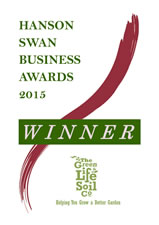| item(s), Total: $0.00 View Cart |
| Shopping cart is empty. |
Speaking of gardening experts, we're currently working on a whole new program of workshops for the 2nd half of the year... while dates are yet to be confirmed, we've been talking to a range of presenters to bring you some of the favourites plus some brand new ones including Growing Bush Foods, Plants and planning for Fire Risk, Crop Rotation & Companion Planting, Soil Preparation for Spring... and more! We hope to have dates locked in for the next newsletter; and remember to check in with our 'Events' page on our website (once dates are confirmed) for more info and bookings. We've also got a great offer for VIP's... we hope to encourage you to get prepared for your Spring garden! You know it's only around the corner. Remember that if it's too cold or too wet for you to come out to visit Green Life - you can shop 24/7 online and have your gardening essentials delivered. Too easy! Winter opening hours take effect from 1st July 2017. We're open from 8.30 - 4.00pm Monday - Saturday; and 8.30 - 2.00pm Sundays. Should you need to pick soil up outside of these hours (particularly trade customers) please contact us and we'll do our best to accommodate your needs.
In this Newsletter:Jobs to do - July in the Garden
Check out our online planting guides for vegetable crops AND herbs here (plus detailed growing guides for our favourite vegies!)
Some ideas to plant now include: Artichokes (Globe & Jerusalem), Asian Greens, Asparagus crowns, Beetroot, Broccoli, Cabbage, Carrots, Celery, Kale, Lettuce, Onion, Parsnip, Peas, Potatoes, Radish, Rhubarb crowns, Silverbeet, Snow Peas, Spring Onion, Strawberries. Plus many herbs like Coriander, Chives, Thyme - etc.
Deciduous and fruiting trees
Green Life Soil Co has for many years used clays and silt in their soil mixes to aid water holding in Perth's notoriously sandy soil. Sand Remedy is a product we have produced FOREVER containing bentonite and a mixture of other minerals to enhance water and nutrient retention. We carry bentonite as a mineral product on its own, too - for those that need it. In recent years, there has been much discussion (and in some online forums - much HEATED discussion) concerning bentonite Vs. another form of clay - kaolinite. We have always felt that BOTH clays do an important job, and both have their advantages. But - just like football teams - people have their definite favourites; so Green Life has been on the search for a quality product containing kaolinite to keep in stock.
We're selling it in 15kg bags if you only have a small area to use; or if you have a large garden project we can supply it by the scoop/trailer/cubic metre; or by 1000L or 500L bulkabags (pictured here). Perfect for revamping your garden beds in time for Spring!
If yellowing continues to be an issue, it might be worth a pH test of the soil to ensure conditions are OK. If soil is too alkaline, citrus find it difficult to access iron, and tend to yellow in the new growth. Magnesium is another common deficiency with citrus; and tends to show up as yellowing in older leaves. (These are very broad nutrient indicators, so it's worth investigating reputable gardening books or websites to compare clear photos with what's happening to your trees.) In most cases, a mineral based fertiliser (like Rocky Rock Dust or Growsafe) will help correct any imbalances as long as your pH is within the 'normal' range. We are happy to test your soil's pH if you'd like to drop in a sample sometime.
Another common insect pest is the citrus leafminer. This is a small moth that lays eggs on your citrus, and its the larvae that cause the damage by burrowing into the leaf and eating out the tissue within the leaf itself - leaving a small but tell-tale silvery, wiggly path of destruction in its wake. Because the internal leaf tissue is damaged, it causes the leaves to curl and distort, which is often the first time you may even notice there's a problem with your tree. These little bugs are tiny - only a couple of mm long - and don't actually do much damage before they emerge as adults and fly away. Most organic growers tolerate them; but if you have a young tree you may wish to treat the pest to give it the best shot to establish. The trouble is there's no point in using any spray if the larvae are no longer present; so if you inspect the leaves and can't find them there - you're already too late! Just remember to check your trees earlier next year, and if you find them, you can treat with pest oil. Should you wish to transplant a citrus tree, winter is a good time to do it. Prepare the new planting site well with something like Green Life's General Concentrate, and dig out a large hole. Try to remove the tree with as much of the root mass intact as possible. If you damage any roots, trim off cleanly. Remove at least one third of the tree's branches and leaf matter, and any fruit. It may look severe but it will actually help the tree survive, and citrus can cope with heaving pruning. Seaweed or kelp fertilizers are said to help with transplant shock; water in well with a solution of this and repeat with a light dose fortnightly for a couple of months. If you need to transplant the tree to a whole different property, protect the roots in transit with damp hessian, and if at all possible; also the top growth of the tree. It is best to replant as soon as possible after uprooting from its original position, so plan ahead.
Sometimes, you may notice your citrus fruit splitting. This is often a little bit after we've had some rain, and is caused because the plant is suddenly pumping all this available water to the fruit, but the fruit's skin can't grow or stretch quickly enough - resulting in splitting. You can generally avoid this by making sure that in dry conditions in winter, you still give the trees a good water once a week. With a little bit of care and attention, citrus are thoroughly rewarding plants to grow in the home garden. Look out for dwarf varieties which can be successfully grown in pots (we'd still recommend about a 100L size) in small spaces. If you're growing citrus in pots, do make sure they're fed regularly. They're heavy feeders and will exhaust the nutrients in potting mix in a matter of months. Feeding up with a good quality compost in spring & autumn is a good idea, and also use a slow-release fertiliser (Growsafe is perfect as it contains trace elements) in small amounts about 3 - 4 times a year. Mulch with organic matter (something like Lupin, Lucerne or Pea Straw) generously over summer. Look out for some of the new native citrus varieties that are available now. These have been selectively bred by the CSIRO over recent years to improve the size & quality of fruit and robustness of the plant - and some lovely varieties are coming through. Highly popular with gourmet chefs, the small but juicy fruit containing 'citrus caviar' is sought after. There's bound to be at least one variety of citrus you can grow wherever you are - so why not give it a go? VIP SPECIAL OFFER
Up until 31st July, bulk orders booked and paid for will receive half price delivery... which means depending where you are - you can save between $25 - $60. So jump on the phone or send through an email detailing what you need, and we'll get it booked into our system. We appreciate your support. Your feed back is always welcome & we're happy to hear from you with suggestions for what you'd like to see in our newsletters.
|



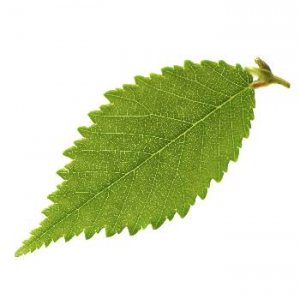 Hello and welcome to our July newsletter! We've passed the shortest day of the year so... ever so slowly... the days are beginning to get longer once more. Let's hope we get a lot more rain between now and Spring. It's certainly been busy @ GLSC. Did you happen to catch Paul & myself on Faye Arcaro's
Hello and welcome to our July newsletter! We've passed the shortest day of the year so... ever so slowly... the days are beginning to get longer once more. Let's hope we get a lot more rain between now and Spring. It's certainly been busy @ GLSC. Did you happen to catch Paul & myself on Faye Arcaro's 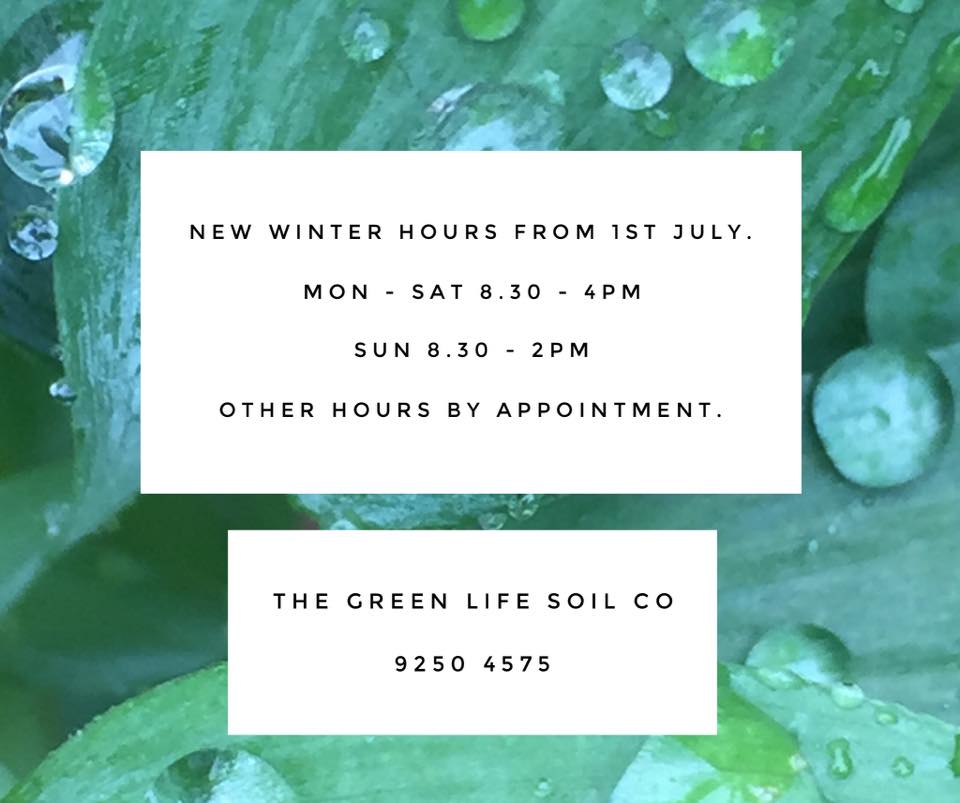 So until next time - have fun, keep warm and happy gardening!
So until next time - have fun, keep warm and happy gardening!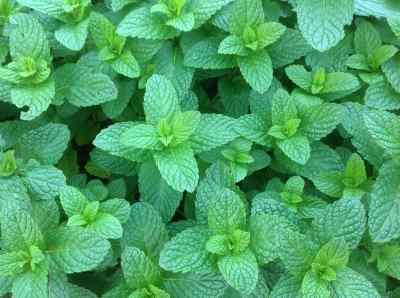 Divide and trim up perennial herbs like mint, thyme, sage, oregano/marjoram, and clumps of chives. Potting up new plants now will mean they'll be looking fabulous in Spring (and you can give away large, lush & gorgeous plants for Christmas gifts!)
Divide and trim up perennial herbs like mint, thyme, sage, oregano/marjoram, and clumps of chives. Potting up new plants now will mean they'll be looking fabulous in Spring (and you can give away large, lush & gorgeous plants for Christmas gifts!)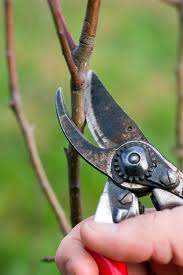 Get your garden tools organised! With pruning jobs on the agenda, spend a while finding all your loppers, secateurs, pruning saws and sharpen and oil them. Remember when pruning, give them a quick wipe over between plants with metho or tea tree oil to make sure you're not inadvertently spreading any diseases as you move through your garden.
Get your garden tools organised! With pruning jobs on the agenda, spend a while finding all your loppers, secateurs, pruning saws and sharpen and oil them. Remember when pruning, give them a quick wipe over between plants with metho or tea tree oil to make sure you're not inadvertently spreading any diseases as you move through your garden.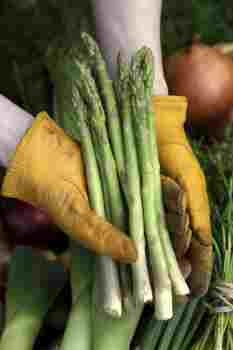
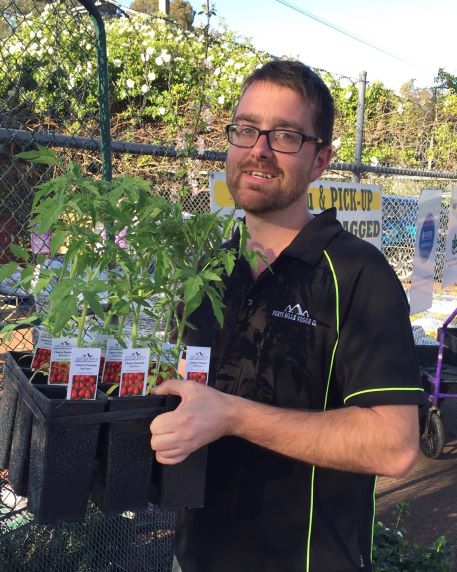
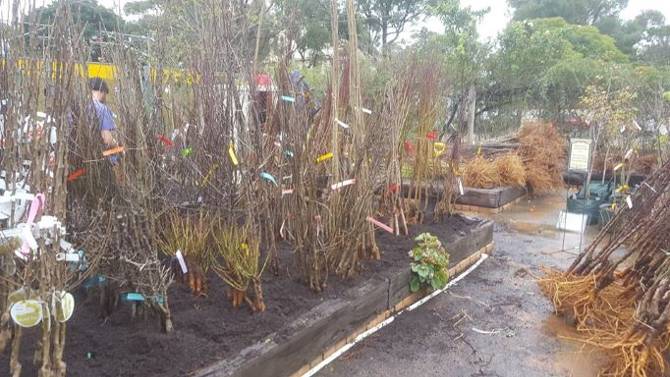 Our friends over at Guildford Town Garden Centre have just received in their HUGE order for bare rooted trees - so go and check out what they have and ask for some advice as to which varieties would suit your garden. Whether you're after something ornamental or fruiting - they've got a great range available.
Our friends over at Guildford Town Garden Centre have just received in their HUGE order for bare rooted trees - so go and check out what they have and ask for some advice as to which varieties would suit your garden. Whether you're after something ornamental or fruiting - they've got a great range available.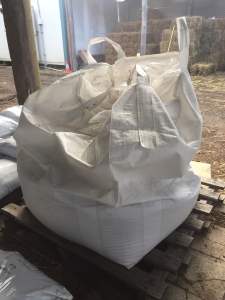 Kaolin fans rejoice! GLSC has been trialing a number of clay products over the past year, and believe we now have a great product to add to our range. 'Cassies Clay' is locally sourced through Soil Amendment Products, and is now available for you to purchase!
Kaolin fans rejoice! GLSC has been trialing a number of clay products over the past year, and believe we now have a great product to add to our range. 'Cassies Clay' is locally sourced through Soil Amendment Products, and is now available for you to purchase!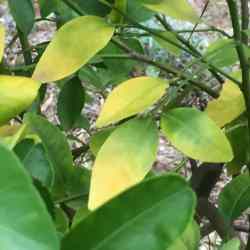 Many people are commenting that their citrus are looking a bit yellow and sad right now. For the most part, this is pretty normal and nothing to worry about. Citrus tend to "slow down" in winter and have a harder time accessing nutrients in the soil. Providing you have been improving the soil over the months, there really isn't much to do right now apart from keeping the weeds away from around the tree base and waiting! Citrus are shallow rooted and don't like too much root competition. Don't allow grass to grow up around the tree, and keep on top of weeds. A good layer of mulch will help with weed suppression over winter and also keeping moisture in the soil over the summer months. Woody mulches are ideal and long lasting. Lay them on up to 10cms thick - just ensure you don't pile it up right against the trunk. Ideally, citrus should be fed at the end of winter/early spring when they're beginning to actively grow again - so adding too much to the soil now won't be much help. I'd suggest waiting another month, and then you can get stuck in with some blood & bone, potash and/or maybe a little bit of aged manure. That's also a good time to give the tree a light trim to ensure it stays a manageable size, and to open up the tree to allow for good airflow. Trim any branches that hang too low to the ground, again for airflow and ease of weed management and watering.
Many people are commenting that their citrus are looking a bit yellow and sad right now. For the most part, this is pretty normal and nothing to worry about. Citrus tend to "slow down" in winter and have a harder time accessing nutrients in the soil. Providing you have been improving the soil over the months, there really isn't much to do right now apart from keeping the weeds away from around the tree base and waiting! Citrus are shallow rooted and don't like too much root competition. Don't allow grass to grow up around the tree, and keep on top of weeds. A good layer of mulch will help with weed suppression over winter and also keeping moisture in the soil over the summer months. Woody mulches are ideal and long lasting. Lay them on up to 10cms thick - just ensure you don't pile it up right against the trunk. Ideally, citrus should be fed at the end of winter/early spring when they're beginning to actively grow again - so adding too much to the soil now won't be much help. I'd suggest waiting another month, and then you can get stuck in with some blood & bone, potash and/or maybe a little bit of aged manure. That's also a good time to give the tree a light trim to ensure it stays a manageable size, and to open up the tree to allow for good airflow. Trim any branches that hang too low to the ground, again for airflow and ease of weed management and watering.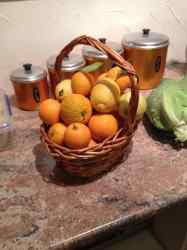 While citrus are fairly pest and disease free - one common pest is scale. These are small sap sucking, hard shelled insects that look like lumps on leaves, leaf veins and stems - you can scratch them off with your fingernail. Ants spread these little critters; because when scale are eating all the plant sap, they're excreting a sweet residue that ants LOVE. Often a giveaway sign is a black mouldy looking residue on the leaves - this is sooty mould; and grows on that excretion covering the leaf surface. It doesn't particularly harm the plant (other than reducing the plant's ability to photosynthesise) and can be removed with a blast from a hose or a bit of water with mild detergent or pure soap dissolved in it. The scale themselves can be dealt with by using horticultural oil (eg. neem oil, eco oil or white oil) which smother the scale. You may need to do 2 or 3 treatments, a week or so apart to make sure you're removing newly hatched scale and breaking the breeding cycle.
While citrus are fairly pest and disease free - one common pest is scale. These are small sap sucking, hard shelled insects that look like lumps on leaves, leaf veins and stems - you can scratch them off with your fingernail. Ants spread these little critters; because when scale are eating all the plant sap, they're excreting a sweet residue that ants LOVE. Often a giveaway sign is a black mouldy looking residue on the leaves - this is sooty mould; and grows on that excretion covering the leaf surface. It doesn't particularly harm the plant (other than reducing the plant's ability to photosynthesise) and can be removed with a blast from a hose or a bit of water with mild detergent or pure soap dissolved in it. The scale themselves can be dealt with by using horticultural oil (eg. neem oil, eco oil or white oil) which smother the scale. You may need to do 2 or 3 treatments, a week or so apart to make sure you're removing newly hatched scale and breaking the breeding cycle._0.jpg) A new pest to WA that has been found here in recent years is the citrus gall wasp. These creatures lay their eggs into the stem of citrus, and a large lump or 'gall' develops, from which the adult eventually emerges. The only way to deal with these is to cut them out. If there are small holes in the gall, the insect has already emerged. If the gall is intact, the Ag Department recommends mulching (make sure the gall is destroyed) or burning, or deeply burying. They urge people NOT to dispose of them in your green waste or rubbish bin, as this can still lead to adults emerging and the spread of the pest. In large numbers, the citrus gall wasp will affect productivity of the tree and it can be devastating to commercial growers - so please play your part in dealing with the pest. The Ag Department are still asking people to notify them of where you find the pest. You won't get into trouble for having it - but they're wanting to monitor the spread of it throughout WA. The good news is other states have had success with releasing a predatory wasp; so if the WA Ag Department knows which suburbs are affected, they can release the predators nearby and help to stem the spread of the pest wasp.
A new pest to WA that has been found here in recent years is the citrus gall wasp. These creatures lay their eggs into the stem of citrus, and a large lump or 'gall' develops, from which the adult eventually emerges. The only way to deal with these is to cut them out. If there are small holes in the gall, the insect has already emerged. If the gall is intact, the Ag Department recommends mulching (make sure the gall is destroyed) or burning, or deeply burying. They urge people NOT to dispose of them in your green waste or rubbish bin, as this can still lead to adults emerging and the spread of the pest. In large numbers, the citrus gall wasp will affect productivity of the tree and it can be devastating to commercial growers - so please play your part in dealing with the pest. The Ag Department are still asking people to notify them of where you find the pest. You won't get into trouble for having it - but they're wanting to monitor the spread of it throughout WA. The good news is other states have had success with releasing a predatory wasp; so if the WA Ag Department knows which suburbs are affected, they can release the predators nearby and help to stem the spread of the pest wasp. If you have fruit on your tree now, it is ready to be picked if you can remove the fruit with a light twist and some gentle pressure. If it won't come off - it's probably not quite ready. You'll find that the fruit exposed to more sun will ripen first. Keep an eye out for fruit fly; although if your fruit is already struck there's not much you can do about it other than minimising the spread and trying to break the cycle for next time. Never allow fallen fruit to stay under the tree. Dispose of it by sealing in a plastic bag and leaving in the sun for a couple of weeks, or freezing it before putting it in the rubbish bin. Fruit fly larvae can survive most backyard composting and burial in the ground; so you need to ensure the larvae are dealt with. Traps are useful to monitor fruit fly and to help with timing of spraying; but the most effective organic method of control is insect netting over the whole tree or covering your fruit with exclusion bags.
If you have fruit on your tree now, it is ready to be picked if you can remove the fruit with a light twist and some gentle pressure. If it won't come off - it's probably not quite ready. You'll find that the fruit exposed to more sun will ripen first. Keep an eye out for fruit fly; although if your fruit is already struck there's not much you can do about it other than minimising the spread and trying to break the cycle for next time. Never allow fallen fruit to stay under the tree. Dispose of it by sealing in a plastic bag and leaving in the sun for a couple of weeks, or freezing it before putting it in the rubbish bin. Fruit fly larvae can survive most backyard composting and burial in the ground; so you need to ensure the larvae are dealt with. Traps are useful to monitor fruit fly and to help with timing of spraying; but the most effective organic method of control is insect netting over the whole tree or covering your fruit with exclusion bags. July is often when we experience a seasonal lull @ GLSC. We'd rather keep all of our team busy, so to help we're offering a very special deal to our VIP's as an incentive for you to order with us, and at the same time, help you get organised early for Spring!
July is often when we experience a seasonal lull @ GLSC. We'd rather keep all of our team busy, so to help we're offering a very special deal to our VIP's as an incentive for you to order with us, and at the same time, help you get organised early for Spring!







